2017最新 八上英语期末考点总结
外研版2017年八年级英语上册知识点归纳

外研版2017年八年级英语上册知识点归纳外研版2017年八年级英语上册作为初中英语教育的重要组成部分,其教学内容非常丰富,涵盖了英语听、说、读、写等方面的知识。
为了帮助学生更好地掌握外研版2017年八年级英语上册知识点,本文将对该教材中的主要知识点进行归纳。
1. 语音及发音技巧为了在学习英语时更好地发音和理解,了解英语的语音规则是非常重要的。
外研版2017年八年级英语上册涉及了英语中的重要发音技巧,如长元音和短元音的区分、口语速度掌握技巧、发音与符号的对应关系等。
2. 词汇外研版2017年八年级英语上册通过各种生动有趣的例子,帮助学生学会了丰富的词汇,包括名词、形容词、副词、动词、介词等。
此外,还学会了一些常用短语和习惯用语,如catch one’s eye、take it easy等。
为了巩固所学的词汇,学生可以通过做练习、听网络广播、看英文字幕电影等方法来进行练习和应用。
3. 语法外研版2017年八年级英语上册中,涉及了多种语法知识点,如简单句和复合句的构成、标点符号的应用、动词时态的灵活掌握、形容词和副词的比较级和最高级等。
学生可以在学习中注重理解并结合语言实际运用来巩固所学语法知识。
4. 阅读技巧学生在学习英语的过程中,需要阅读大量的英语材料,外研版2017年八年级英语上册也提供了大量的阅读材料,如文章、诗歌等。
为了更好地读懂英语文章,我们可以把重点放在文章的主题、主旨、态度和感情等方面来进行理解。
此外,阅读过程中注意标注重要词汇和短语,可以在巩固词汇的同时,提高文章的理解能力。
5. 写作技巧外研版2017年八年级英语上册通过各种写作练习,帮助学生提高写作能力。
在写作时,需要注意文章结构,包括段落之间的过渡和逻辑关系的构建。
此外,需要注意正确运用标点符号和拼写单词的规则,可以通过大量的写作实践来提高自己的写作水平。
6. 听力技巧在英语学习过程中,听力是非常重要的一个方面。
外研版2017年八年级英语上册提供了大量的听力材料和听力训练,帮助学生提高英语听力水平。
【人教版】2017版八年级英语上册期末复习知识点总结1 (46)
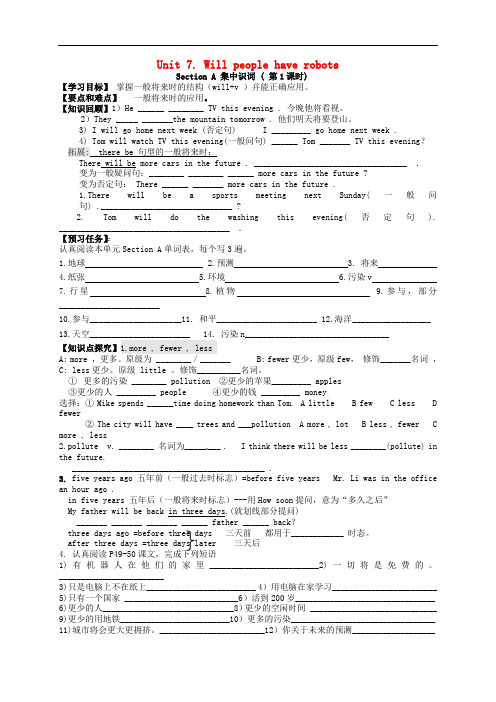
Unit 7. Will people have robotsSection A 集中识词 ( 第1课时)【学习目标】掌握一般将来时的结构(will+v )并能正确应用。
【要点和难点】一般将来时的应用。
【知识回顾】1)He ______ ________ TV this evening . 今晚他将看视。
2)They _____ _______the mountain tomorrow . 他们明天将要登山。
3) I will go home next week (否定句) I _________ go home next week .一般问句) ______ Tom _______ TV this evening?There will be more cars in the future . ___________________________________ .变为一般疑问句:________ ________ ______ more cars in the future ?变为否定句: There ______ _______ more cars in the future .1.There will be a sports meeting next Sunday(一般问句) .______________________________ ?2. Tom will do the washing this evening(否定句)._______________________________________ .【预习任务】:认真阅读本单元Section A单词表,每个写3遍。
1.地球2.预测3. 将来4.纸张5.环境6.污染v7.行星8.植物9.参与,部分_______________________10.参与_____________________11. 和平_______________________ 12.海洋__________________13.天空_______________________ 14. 污染n_________________________________【知识点探究】1.more , fewer , lessA: more ,更多。
【人教版】2017版八年级英语上册期末复习知识点总结1 (38)
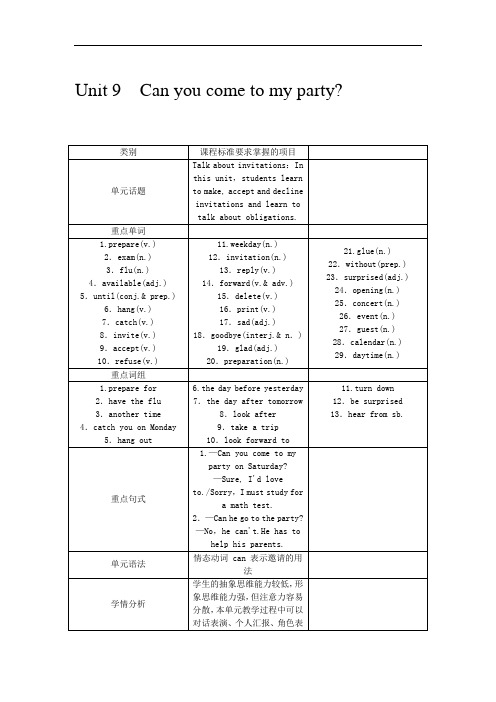
Unit 9Can you come to my party?第一课时Section A (1a~1c)§自主学习案根据句意及首字母提示完成单词。
1.She didn't go to school and stayed in bed because she had the f lu.2.Can you come and h elp me with my English?3.Can I m eet my friend tomorrow, Mom?4.I must go to see a d octor because I feel ill.5.My mother prepares for b reakfast for our family every morning.§课堂导学案Step 1准备与热身(Preparation)Hello,class.We are learning Unit 9 today.But first look at this sentence:Can you come to my party? What does it mean?You are correct. It means “你能来参加我的聚会吗?”“Can”means “能,行”. You may answer like these: Yes,I can.I can come to the party./No. I can't.I have to do my homework. In these sentences both can and have to are model verbs. They are part of the predicates.Can you come to school? Yes, I can./No, I can't.I have to see a doctor.Can you get to school by bus? Yes, I can./No, I can't.I have to walk.Step 2呈现与输入(Presentation)Please look at the picture on page 65. The boy in the middle is going to hold a party.Can everyone come to the party?Help my parents, prepare for an exam, meet my friends,have the flu, go to the doctor.Please read these expressions loudly. And match the words with the picture.Areyou OK? Let's check the answers.Step 3练习与体验(Practice)You are great ! As you see, there are some people in the picture.Do you know who's who?Now please listen to the conversation.Pay attention to Sun Ning's words carefully.He says the names of each person he is inviting. When I play the recording for the first time,you just listen carefully. When I play the recording for the second time,please write the names of each person next to his or her picture. You have to complete the activity on your own.OK, let's go!Now let's talk as they do in the conversation.In other words, we are going to talk in imitation of the conversation we have just heard and read.Step 4运用与生成(Production)Now please make your own dialogues in groups of four. Suppose you are the students in the picture. One of you is inviting the other three students to his party. The other students are saying if he can go or not.If you can't go, remember to give a reason.When you practice, please pay attention to the pronunciation and intonation.I'll offer vocabulary and pronunciation support if you need.Step 5巩固与提高(Progress)【探究点】Can you come to my party on Saturday afternoon? 你能在周六下午来参加我的聚会吗?Can you…?句型是熟人和朋友之间常用的表达邀请或请求的用语。
【人教版】2017版八年级英语上册期末复习知识点总结1 (32)
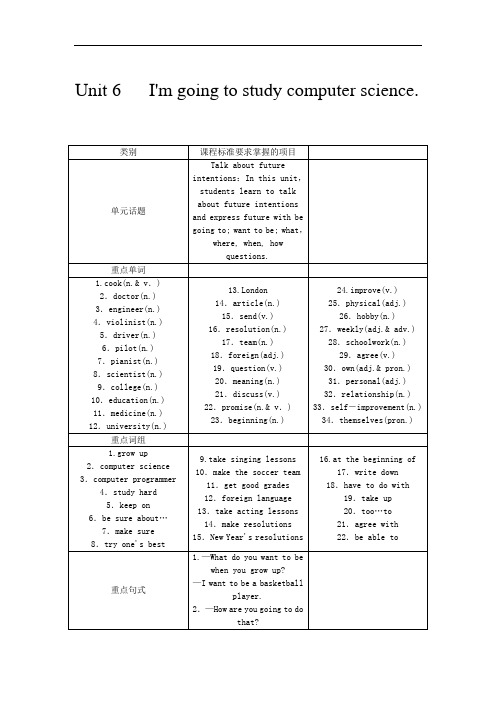
Unit 6I'm going to study computer science.第一课时Section A (1a~1c)§自主学习案用所给单词的适当形式填空。
1.My father is a computer programmer (program)in a big company.2.Why do you want to be a scientist(science)?3.What does he want to be when he grows(grow) up?4.Li Yundi is a famous pianist(piano)in the world.5.Li Ming wants to be a basketball player(play) like Yao Ming.§课堂导学案Step 1准备与热身(Preparation)Hello,everyone!We know every child has his own great idea. I think you do the same. When you grow up, maybe you want to be a teacher, a businessman, a pilot, or an engineer. Today we are going to talk about the topic about your intention. Turn to look at Unit 6:I'm going to study computer science.Look at the blackboard and read after me the target language for this unit.When you read,pay attention to going to,want to be,and what, where, when, how questions.Do you know what intention means? It means something you want to do or plan to do in the future. It is not something which will definitely happen.I will give you one minute to think about ways you already know to talk about future events. And you can use the question words where, when, what, how long to ask and answer questions.For example:Q:Where are you going next week?A:I'm going to summer camp.Q:How long are you staying?A:I'm staying for a week.Q:What are you going to do?A:I'm swimming there.From the above we know that -ing words express the future tense.Now look at the sentences in the speech bubble on page 41. In this unit, we are using-ing words to talk about things that may or may not happen. We are talking about plans.Step 2呈现与输入(Presentation)On page 41 you will find a box with twelve different jobs. Now you are going to rank the twelve jobs from the most interesting to the least interesting.And after that you shall fall into pairs to talk about the reasons.Step 3练习与体验(Practice)Listen and fill in the blanks. Read the phrases in the two columns first. Then listen to four conversations and draw lines connecting the jobs and the activities.Let's check the answers.Keys: 1→b; 2→c; 3→d; 4→aStep 4运用与生成(Production)Now in pairs go on to ask your partner what they are going to be and how they are going to do.Now I'll give you a model conversation and you may practice like this:A:What do you want to be when you grow up?B:I want to be a basketball player.A:How are you going to do that?B:I'm going to practice basketball every day.This period we've learnt the questions of what you are going to do, where you are going, how you are going to do that and when you are going to do.Plan first is a good start.Step 5巩固与提高(Progress)【探究点】What are you going to be when you grow up?你长大以后打算做什么?①“be going to+动词原形”构成一般将来时态,表示计划或安排要发生的动作,有时也可以表示推测将要或肯定会发生的动作,有“准备;打算”之意。
最新-八上英语期末考点总结
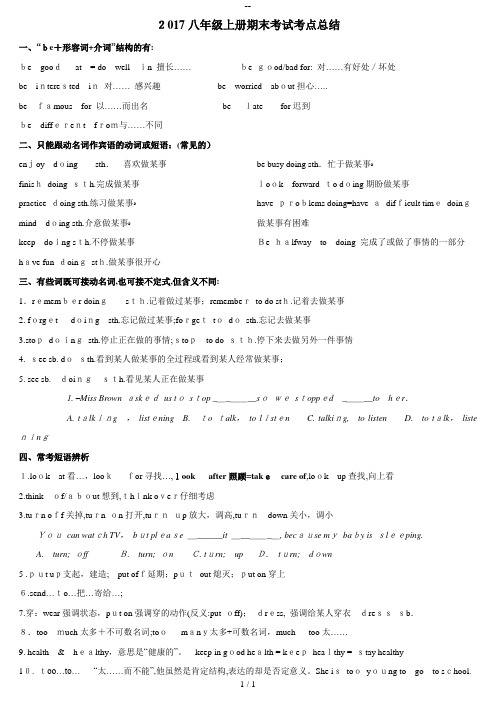
2017八年级上册期末考试考点总结一、“be+形容词+介词”结构的有:be goodat= do wellin 擅长…… be good/bad for: 对……有好处/坏处be interested in对…… 感兴趣be worried about担心…..be famous for 以……而出名be late for迟到be different from与……不同二、只能跟动名词作宾语的动词或短语:(常见的)enjoy doing sth.喜欢做某事finishdoing sth.完成做某事practice doing sth.练习做某事ﻩmind doing sth.介意做某事ﻩkeep doing sth.不停做某事have fun doingsth.做某事很开心be busy doing sth.忙于做某事ﻩlook forward to doing期盼做某事have problems doing=have adifficult timedoing做某事有困难Be halfway to doing 完成了或做了事情的一部分三、有些词既可接动名词,也可接不定式,但含义不同:1.remember doingsth.记着做过某事;rememberto do sth.记着去做某事2. forget doing sth.忘记做过某事;forgettodosth.忘记去做某事3.stopdoingsth.停止正在做的事情;stopto do sth.停下来去做另外一件事情4. see sb. dosth.看到某人做某事的全过程或看到某人经常做某事;5. see sb.doingsth.看见某人正在做某事1. –Miss Brown askedus tostop _______sowestopped_____to her.A. talking,listeningB.to talk,to listenC. talking,to listenD.to talk,liste ning四、常考短语辨析1.look at看…,lookfor寻找…,look after照顾=takecare of,look up查找,向上看2.think of/about想到,think over仔细考虑3.turn off关掉,turn on打开,turnup放大,调高,turndown关小,调小Youcan watch TV,but please _______it _______, because mybaby is sleeping.A.turn; off B.turn; on C. turn;up D.turn;down5 .put up支起,建造;put off延期;putout熄灭;put on穿上6.send…to…把…寄给…;7.穿:wear强调状态,put on强调穿的动作(反义:put off);dress, 强调给某人穿衣dresssb.8.toomuch太多+不可数名词;toomany太多+可数名词,much too太……9. health &healthy,意思是“健康的”。
2017八年级英语上册重要知识点汇总
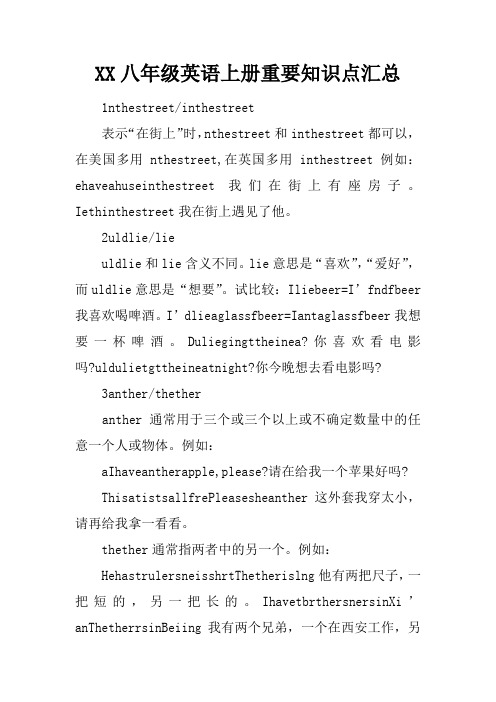
XX八年级英语上册重要知识点汇总1nthestreet/inthestreet表示“在街上”时,nthestreet和inthestreet都可以,在美国多用nthestreet,在英国多用inthestreet例如:ehaveahuseinthestreet我们在街上有座房子。
Iethinthestreet我在街上遇见了他。
2uldlie/lieuldlie和lie含义不同。
lie意思是“喜欢”,“爱好”,而uldlie意思是“想要”。
试比较:Iliebeer=I’fndfbeer 我喜欢喝啤酒。
I’dlieaglassfbeer=Iantaglassfbeer我想要一杯啤酒。
Duliegingttheinea?你喜欢看电影吗?uldulietgttheineatnight?你今晚想去看电影吗?3anther/thetheranther通常用于三个或三个以上或不确定数量中的任意一个人或物体。
例如:aIhaveantherapple,please?请在给我一个苹果好吗?ThisatistsallfrePleasesheanther这外套我穿太小,请再给我拿一看看。
thether通常指两者中的另一个。
例如:HehastrulersneisshrtThetherislng他有两把尺子,一把短的,另一把长的。
IhavetbrthersnersinXi’anThetherrsinBeiing我有两个兄弟,一个在西安工作,另一个在北京工作。
4havet/usthavet和ust都可以用来谈论义务,但用法略有不同。
如果某人主观上觉得必须去做而又想去时,常用ust。
如果谈论某种来自“外界”的义务,常用havet。
例如:Iuststpsing 我必须戒烟。
Thehavetrfrthebss他们不得不为那个老板工作。
havet可用于多种时态,ust只能用于一般现在时。
例如:I’llhavetgetupearltrrrning明天早晨我必须早早起床。
【人教版】2017版八年级英语上册期末复习知识点总结1 (48)
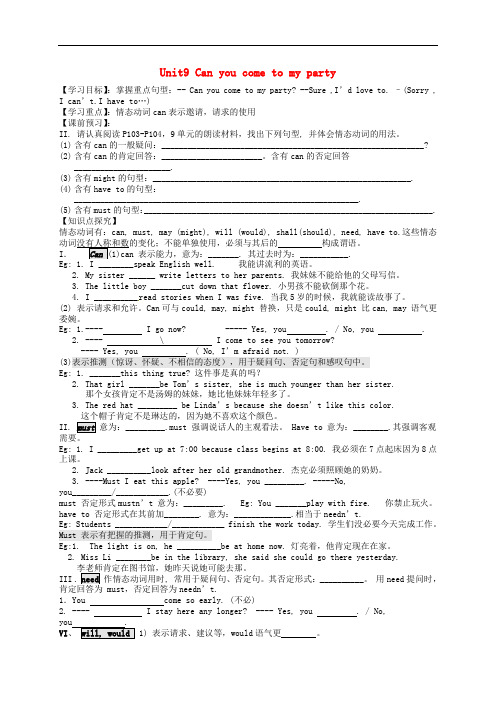
Unit9 Can you come to my party【学习目标】:掌握重点句型:-- Can you come to my party? --Sure ,I’d love to. –(Sorry , I can’t.I have to…)【学习重点】:情态动词can表示邀请,请求的使用【课前预习】:II. 请认真阅读P103-P104,9单元的朗读材料,找出下列句型, 并体会情态动词的用法。
(1)含有can的一般疑问:____________________________________________________________?(2)含有can的肯定回答:_______________________。
含有can的否定回答______________________.(3)含有might的句型:___________________________________________________________.(4)含有have to的句型:_________________________________________________________________.(5)含有must的句型:__________________________________________________________________.4. I __________read stories when I was five.Eg: 1. __ \ ___ you pass me the ball, please? 把球递给我好吗?2. ____________you tell me the way to the station? 你可以告诉我去车站的路吗?Would还可以与love, like构成短语:would love/ like sth/ to do sth 想要某物或想要做某事。
2017最新-八上英语期末考点总结
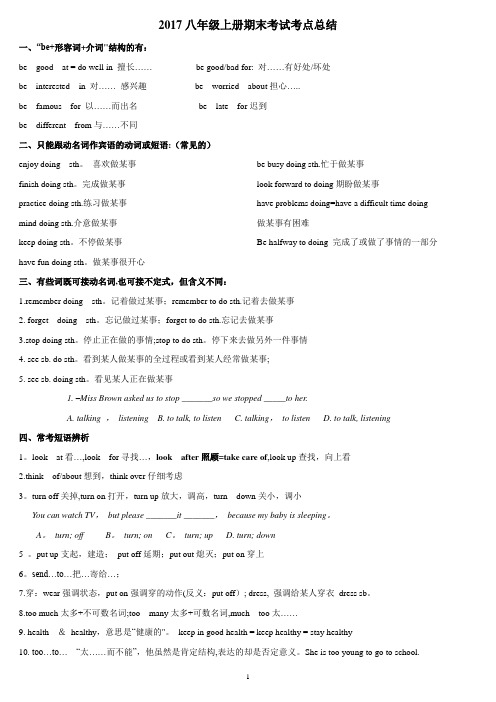
2017八年级上册期末考试考点总结一、“be+形容词+介词"结构的有:be good at = do well in 擅长…… be good/bad for: 对……有好处/坏处be interested in 对…… 感兴趣be worried about担心…..be famous for 以……而出名be late for迟到be different from与……不同二、只能跟动名词作宾语的动词或短语:(常见的)enjoy doing sth。
喜欢做某事finish doing sth。
完成做某事practice doing sth.练习做某事mind doing sth.介意做某事keep doing sth。
不停做某事have fun doing sth。
做某事很开心be busy doing sth.忙于做某事look forward to doing期盼做某事have problems doing=have a difficult time doing 做某事有困难Be halfway to doing 完成了或做了事情的一部分三、有些词既可接动名词,也可接不定式,但含义不同:1.remember doing sth。
记着做过某事;remember to do sth.记着去做某事2. forget doing sth。
忘记做过某事;forget to do sth.忘记去做某事3.stop doing sth。
停止正在做的事情;stop to do sth。
停下来去做另外一件事情4. see sb. do sth。
看到某人做某事的全过程或看到某人经常做某事;5. see sb. doing sth。
看见某人正在做某事1. –Miss Brown asked us to stop _______so we stopped _____to her.A. talking ,listeningB. to talk, to listenC. talking,to listenD. to talk, listening四、常考短语辨析1。
2017年人教版八年级英语上册知识点总结(全)
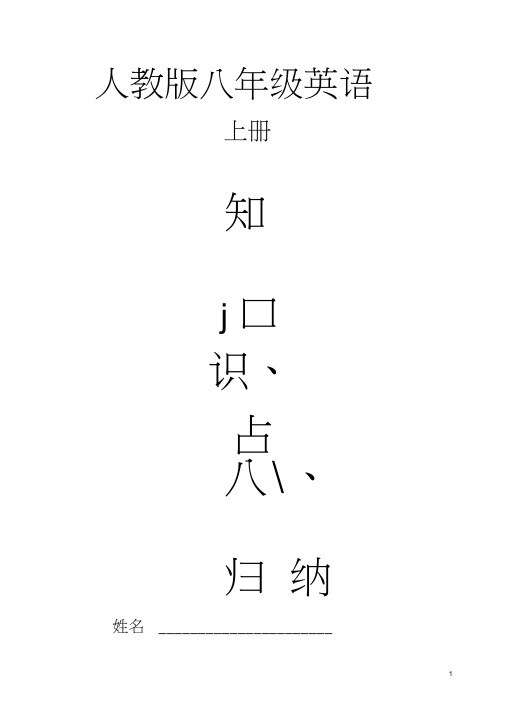
人教版八年级英语上册知j 口识、占八\、归纳姓名 ______________________学校 ______________________班级_______________________Unit 1 How often do you exercise ?一、词汇精讲1、always、usually、often、sometimes、hardly ever 和neveralways、usually、often、sometimes、hardly ever 和never 是英语中最常见的频度畐寸词。
(1)always的频度为100%,表示动作重复、状态继续,中间没有间断,意思是总是” 永远地”。
The sun always rises in the east and sets in the west太阳总是东升西落。
(2)usually的频度为70%左右,意为通常” 平常”即很少有例外。
He usually goes to bed at ten o '(他通常10 点钟睡觉。
(3)often的频度为50%左右,意为常常”但不如usually那么频繁,表示动作重复,中间有间断。
He is ofte n late for school. 他上学经常迟到。
(4)sometimes的频度为20%左右,意为有时”表示动作偶尔发生。
可以位于句首,以示强调。
多用于一般现在时。
It is sometimes hot and sometimes cold. 天气忽冷忽热。
Sometimes he does it this way and sometimes he does it that way.他有时这样做,有时那样做。
(5)hardly ever的频度为5%左右,意为几乎不”偶尔”表频率,位置是行前beI hardly ever go out these days. 这些天我几乎不出门。
(6)never的频度为0,意为从来不”永不”My pare nts are n ever late for work. 我父母上班从来不迟至叽【拓展】(1)这些副词在句子中的位置基本相同,一般放在助动词、be动词或情态动词之后,行为动词之前。
2017秋季八年级上册英语知识点总结完整版范文
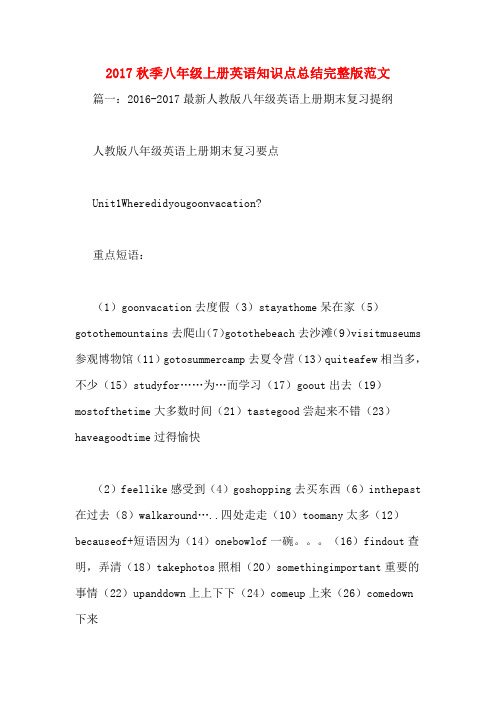
2017秋季八年级上册英语知识点总结完整版范文篇一:2016-2017最新人教版八年级英语上册期末复习提纲人教版八年级英语上册期末复习要点Unit1Wheredidyougoonvacation?重点短语:(1)goonvacation去度假(3)stayathome呆在家(5)gotothemountains去爬山(7)gotothebeach去沙滩(9)visitmuseums 参观博物馆(11)gotosummercamp去夏令营(13)quiteafew相当多,不少(15)studyfor……为…而学习(17)goout出去(19)mostofthetime大多数时间(21)tastegood尝起来不错(23)haveagoodtime过得愉快(2)feellike感受到(4)goshopping去买东西(6)inthepast 在过去(8)walkaround…..四处走走(10)toomany太多(12)becauseof+短语因为(14)onebowlof一碗。
(16)findout查明,弄清(18)takephotos照相(20)somethingimportant重要的事情(22)upanddown上上下下(24)comeup上来(26)comedown下来(25)ofcourse当然重点语法:(1)Wheredidyougoonvacation?IwenttoNewYorkCity.(2)Didyougooutwithanyone?No,Noonewashere.Everyonewasonvacation.(3)Didyoubuyanythingspecial?Yes,Iboughtsomethingformyfather.(4)Howwasthefood?Everythingtastedreallygood.(5)Dideveryonehaveagoodtime?Oh,yes.Everythingwasexcellent.习惯用法:(1)buysthforsb./buysb.sth为某人买某物(2)taste+adj.尝起来……(3)nothing….but+V.(原形)除了…之外什么都没有(4)seem+(tobe)+adj看起来(5).arrivein+大地方arriveat+小地方到达某地(6)decidetodosth.决定做某事(7).trydoingsth.尝试做某事(8)trytodosth.尽力做某事(9)tryone`sbesttodosth尽力做某事1(10)enjoydoingsth.喜欢做某事(11)wanttodosth.想去做某事(12)startdoingsth.开始做某事(13)stopdoingsth.停止做某事stopdoingsth停下来做某事(14)look+adj看起来(15)dislikedoingsth.不喜欢做某事(16)Whynotdosth.为什么不做…….呢?(17)so+adj+that+从句如此…以至于(18)tellsb.(not)todosth.告诉某人(不要)做某事(19)keepdoingsth.继续做某事(20).forgettodosth.忘记去做某事forgetdoingsth忘记做过某事词语辨析:1anywhere与somewhere两者都是不定副词。
【人教版】2017版八年级英语上册期末复习知识点总结1 (33)
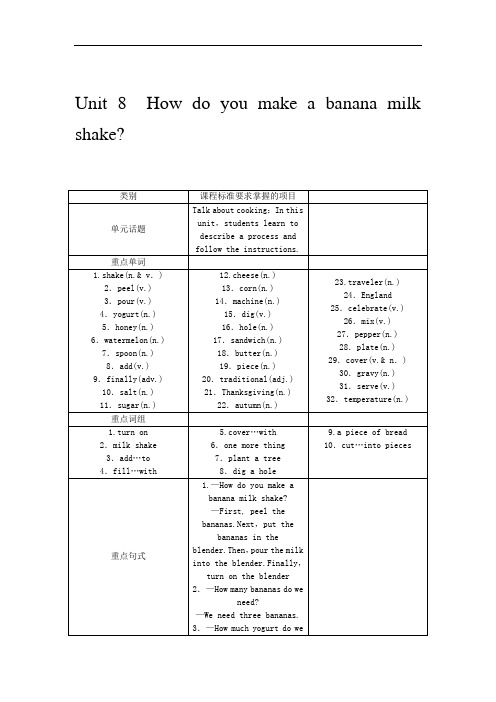
Unit 8How do you make a banana milk shake?第一课时Section A (1a~1c)§自主学习案根据句意及汉语提示完成单词。
1.Do you like to drink yogurt(酸奶)?2.Eating too much salt(盐)is bad for our health.3.Water with honey(蜂蜜)is good for our throat.4.Why are they digging holes(洞)over there?5.You should peel(剥皮)bananas before you eat them.§课堂导学案Step 1准备与热身(Preparation)T:Hello,everyone!Today we are going to talk about drinks. What is your favorite drink?Ss:Coke cola,green tea,water and orange juice.T:Today we are going to learn a new kind of drink,banana milk shake. What is it? A beverage made of milk,flavoring, and ice-cream,shaken or whipped until foamy.Blender means a kind of machine that blends, with whirling blades for chopping, mixing, or liquefying foods. Here are two pictures about them.Let's see how to make a banana milk shake.Warming up by learning grammarGrammar FocusCountable items are things we can count, one, two,three …for example:one pen,two computers. Uncountable items are things we can't count. They are not separate items.When we talk about them we should use a noun that can express amount, for example,a cup of milk,one teaspoon of cinnamon.Step 2呈现与输入(Presentation)Look at the picture in 1a on page 57. There are some actions.What are they doing? Let's see how to fill them into the picture.When you do this exercise you should pay attention to the order of these actions.Step 3练习与体验(Practice)If we want to make something,we should follow the instructions.Instruction means a guide to make something that you can follow. Let's listen to the tape and put the instructions in the right order and we will know how to make a banana milk shake.Step 4运用与生成(Production)First,we should read the instructions several times.Then please don't look at your books and tell your partners how to make a banana milk shake. You can use these words “first, next, then and finally”. Sometimes English speakers pause after these words and this helps the listener notice that the speaker is saying a set of steps. You can pay attention to it when you talk with your partner.Step 5巩固与提高(Progress)【探究点】Turn on the blender.打开搅拌器。
【人教版】2017版八年级英语上册期末复习知识点总结1 (3)
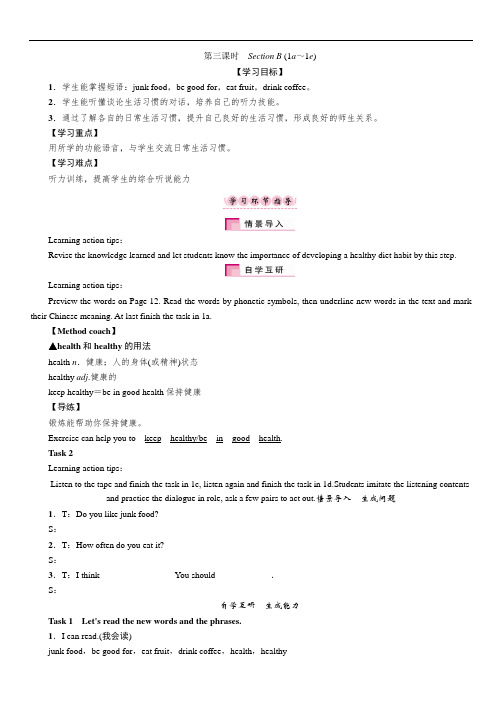
第三课时Section B (1a~1e)【学习目标】1.学生能掌握短语:junk food,be good for,eat fruit,drink coffee。
2.学生能听懂谈论生活习惯的对话,培养自己的听力技能。
3.通过了解各自的日常生活习惯,提升自己良好的生活习惯,形成良好的师生关系。
【学习重点】用所学的功能语言,与学生交流日常生活习惯。
【学习难点】听力训练,提高学生的综合听说能力Learning action tips:Revise the knowledge learned and let students know the importance of developing a healthy diet habit by this step.Learning action tips:Preview the words on Page 12. Read the words by phonetic symbols, then underline new words in the text and mark their Chinese meaning. At last finish the task in 1a.【Method coach】▲health和healthy的用法health n.健康;人的身体(或精神)状态healthy adj.健康的keep healthy=be in good health保持健康【导练】锻炼能帮助你保持健康。
Exercise can help you to__keep__healthy/be__in__good__health.Task 2Learning action tips:Listen to the tape and finish the task in 1c, listen again and finish the task in 1d.Students imitate the listening contents and practice the dialogue in role, ask a few pairs to act out.情景导入生成问题1.T:Do you like junk food?S:________________________________________________________________________2.T:How often do you eat it?S:________________________________________________________________________3.T:I think ________________ You should ____________.S:________________________________________________________________________自学互研生成能力Task 1Let's read the new words and the phrases.1.I can read.(我会读)junk food,be good for,eat fruit,drink coffee,health,healthy2.I can write.(我会写)翻译下列短语和句子。
【人教版】2017版八年级英语上册期末复习知识点总结1 (8)
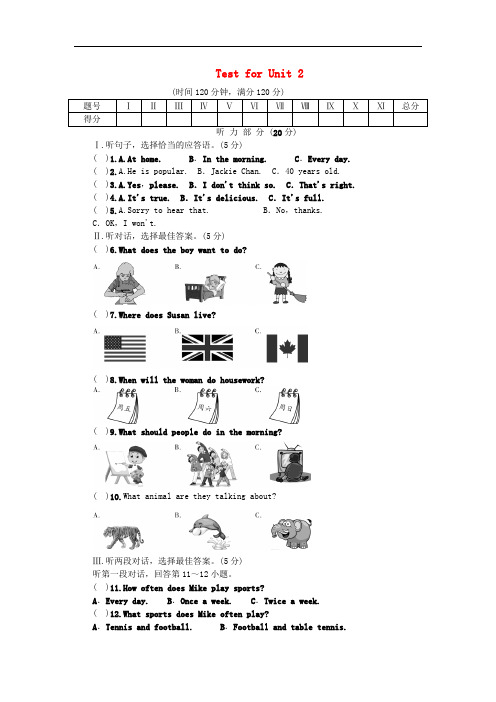
Test for Unit 2听力部分(20分)Ⅰ.听句子,选择恰当的应答语。
(5分)( )1.A.At home.B.In the morning.C.Every day. ( )2.A.He is popular. B.Jackie Chan. C.40 years old. ( )3.A.Yes,please. B.I don't think so. C.That's right. ( )4.A.It's true. B.It's delicious. C.It's full.( )5.A.Sorry to hear that. B.No,thanks. C.OK,I won't.Ⅱ.听对话,选择最佳答案。
(5分)( )6.What does the boy want to do?( )7.Where does Susan live?( )8.When will the woman do housework?( )9.What should people do in the morning?( )10.What animal are they talking about?Ⅲ.听两段对话,选择最佳答案。
(5分)听第一段对话,回答第11~12小题。
( )11.How often does Mike play sports?A.Every day.B.Once a week.C.Twice a week.( )12.What sports does Mike often play?A.Tennis and football.B.Football and table tennis.C.Basketball and football.听第二段对话,回答第13~15小题。
( )13.What's Jim's favorite fruit?A.Pears. B.Apples. C.Oranges.( )14.When does Jim drink milk?A.In the morning.B.In the morning and in the afternoon.C.In the morning and before he goes to bed.( )15.How often does Jim eat meat?A.Never. B.Once a week. C.Once a month.Ⅳ.听短文,完成表格,每空词数不限。
- 1、下载文档前请自行甄别文档内容的完整性,平台不提供额外的编辑、内容补充、找答案等附加服务。
- 2、"仅部分预览"的文档,不可在线预览部分如存在完整性等问题,可反馈申请退款(可完整预览的文档不适用该条件!)。
- 3、如文档侵犯您的权益,请联系客服反馈,我们会尽快为您处理(人工客服工作时间:9:00-18:30)。
2017八年级上册期末考试考点总结一、“be+形容词+介词”结构的有:be good at = do well in 擅长…… be good/bad for: 对……有好处/坏处be interested in 对…… 感兴趣be worried about担心…..be famous for 以……而出名be late for迟到be different from与……不同二、只能跟动名词作宾语的动词或短语:(常见的)enjoy doing sth. 喜欢做某事finish doing sth.完成做某事practice doing sth.练习做某事mind doing sth.介意做某事keep doing sth.不停做某事have fun doing sth.做某事很开心be busy doing sth.忙于做某事look forward to doing期盼做某事have problems doing=have a difficult time doing 做某事有困难Be halfway to doing 完成了或做了事情的一部分三、有些词既可接动名词,也可接不定式,但含义不同:1.remember doing sth.记着做过某事;remember to do sth.记着去做某事2. forget doing sth.忘记做过某事;forget to do sth.忘记去做某事3.stop doing sth.停止正在做的事情;stop to do sth.停下来去做另外一件事情4. see sb. do sth.看到某人做某事的全过程或看到某人经常做某事;5. see sb. doing sth.看见某人正在做某事1. –Miss Brown asked us to stop _______so we stopped _____to her.A. talking , listeningB. to talk, to listenC. talking, to listenD. to talk, listening四、常考短语辨析1.look at看…,look for寻找…,look after照顾=take care of,look up查找,向上看2.think of/about想到,think over仔细考虑3.turn off关掉,turn on打开,turn up放大,调高,turn down关小,调小You can watch TV, but please _______it _______, because my baby is sleeping.A. turn; offB. turn; onC. turn; upD. turn; down5 .put up支起,建造;put off延期;put out熄灭;put on穿上6.send…to…把…寄给…;7.穿:wear强调状态,put on强调穿的动作(反义:put off); dress, 强调给某人穿衣dress sb.8.too much太多+不可数名词;too many太多+可数名词,much too太……9. health & healthy,意思是“健康的”。
keep in good health = keep healthy = stay healthy10. too…to… “太……而不能”,他虽然是肯定结构,表达的却是否定意义。
She is too young to go to school.Hearing the good news, I was ______excited _____say a word.A. very, toB. enough, toC. so, toD. too, to11. because 和because of区别The students couldn’t go to school ______the heavy snow. A. even though B. because C. like D. because of五、常考句型1. (1)how often表示“多久一次”,是对动作的频率进行提问。
可用于回答表示频率的副词,如always, usually, often, sometimes, hardly ever, never等,或用于回答表示频率的短语(2 ) how many,how much表示“多少” how many后接可数名词复数,how much接不可数名词。
(3)how many times询问多少次,其答语表示次数。
如:once twice,three times等(4)how long 询问多长时间,其答语表示一段时间,如:for two days,for three hours等。
(5) how far 询问距离,其答语表示一段距离,如:10miles , ten minutes’ walk等(6)how soon 多久,对“in+时间段”提问,如: How soon will you come back? –In two books.--________did you learn Spanish? --Four nearly four years.A. WhenB. How farC. How longD. How often2.It’s +形容词+to do sth. 是个固定句型,意思是“做某事是(怎样的)”。
类似的结构还有:“It’s+形容词+for sb. to do sth.”意思是“对于某人来说,做某事是(怎样的)”。
形容词如:easy, good, difficult , important, hard , different等▲It’s easy to have a healthy lifestyle, and it’s important to eat a balanced diet. 拥有一个健康的生活方式很容易,营养均衡很重要。
▲ It’s easy to pass the English exam. 通过这次英语考试很容易。
___important ___us____ good eating habits.A .It’s; for; to have B. That’s; for ;to have C. It’s ; of; to have D. That’s ;of ;having3. 不定代词的用法1)some-类复合不定代词多用于肯定句,也可用于表示邀请、请求或建议的疑问在句中;any-类复合不定代词多用于否定句、疑问句和条件句中,也可用于肯定句中,意为“任何人”或“任何事”I have something interesting to tell you. 我有有趣的事情要告诉你。
Would you like something to eat? 你想要些吃的吗?She couldn’t see anything in the dark room. 在这个黑暗的房间里她什么也看不见。
2)复合不定代词被形容词修饰时,形容词要放在复合不定代词的后面。
如:Is there anything interesting in today’s newspaper? 今天的报纸上有什么有趣的消息吗?I’m going to _____for this winter vacation.A. somewhere warmB. interesting placesC. quiet somewhereD. anywhere fun4. although尽管、虽然引导让步状语从句不和but连用He still went to the park with his daughter ,___it rained all day.A. andB. althoughC. butD. yet5. 如何学会提出建议英语中常见的表示建议的方式有以下几种情况:Why don’t you…=Why not do…?为什么不做……?Let’s do…!让我们做……吧What about doing……?=How about doing……?做……怎么样?Would you like to do…?你想做……?Would like to = want toShall we do…?我们做……,好吗?其答语I’d love to.回答对方客气的邀请:我很愿意去。
要是不愿意可以说Sorry.--Would you like to go for a walk with us?--________.A. Yes, I’d likeB. No, I can’tC. Yes, I ‘d love toD. Yes, I would6. 1)sound 系动词用法:“听起来”后+形容词。
That sounds nice/ beautiful.类似的用法还有:look feel(感觉)taste(品尝)smell(闻起来)其后面的形容词往往是interesting, good, nice ,delicious 2) sound like: “听起来像”后+名词Her voice sounds like a bird. 她的声音听起来像小鸟。
--Listen! Who is singing? --It ______Dennis.A. soundsB. sound likeC. sounds likeD. sounds love7. leave的用法1)动身去…… leave +地点for+地点离开某地去某地leave for +地点去某地leave Shanghai for Beijing leave for Hangzhou2)遗留,落下。
leave+宾语+介词短语/副词:把……忘在……Would you like to leave a message?I left my book on the train yesterday.注意:forget表示“忘记做某事”不强调地点,而leave强调把某物忘在某地。
8. It takes sb. +一段时间+to do sth.“做某事花费某人多长时间”It takes about 25 minutes to walk to school. 去学校要花25分钟的时间。
It took her some time ______English in class.A. finish readingB. to finish to readC. to finish readingD. finish to readingIt will take ______years to make robots _______the most unpleasant things.A. hundred, doB. hundreds of , to doC. two hundreds, doD. hundreds of , do表花费的几个词的区别Cost\pay\spend\takeDoing sth He spent an hour reading this passage.Spend: 人+spend+ 时间/金钱+On sth. He spent two yuan on this book.注意:考题往往以疑问句的形式出题How long does it take? –It takes 25 minutes.--Arthur is a loving grandmother. –Yeah, she ____all her free time with her grandchildren.A. paysB. spendsC. takesD. puts9. 辨析another, other, the other, others, the others1) another指三个或三个以上人或事物中的另一个,只能修饰单数名词;又一,再一(个)The T-shirt is too small. Can you show me another (one)? Cook for another 10 minutes. 再煮10分钟数词+more+名词=another+数次+名词Another ten boys = ten more boys (另外10个男孩) 又,另外的2) (the)other有两种用法:a. one…,the other…用来指已知的两个人或事物中的另一个。
